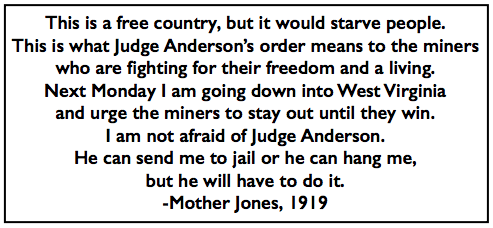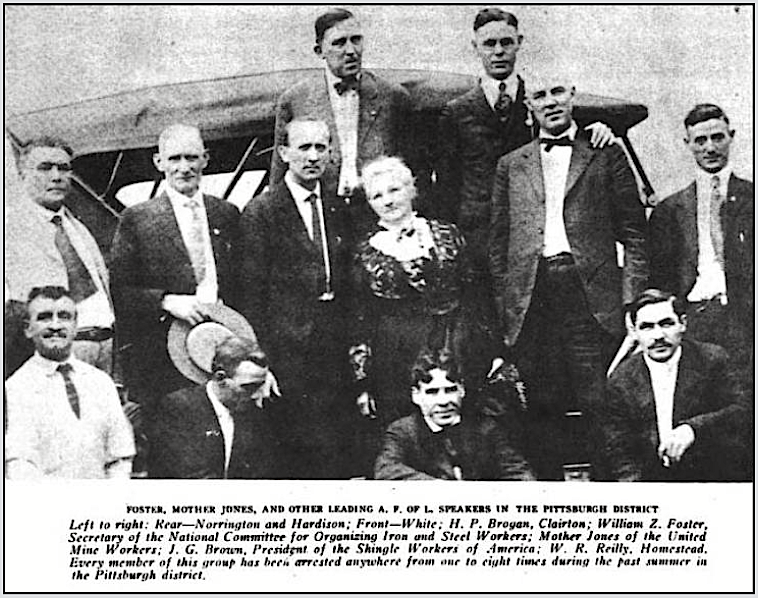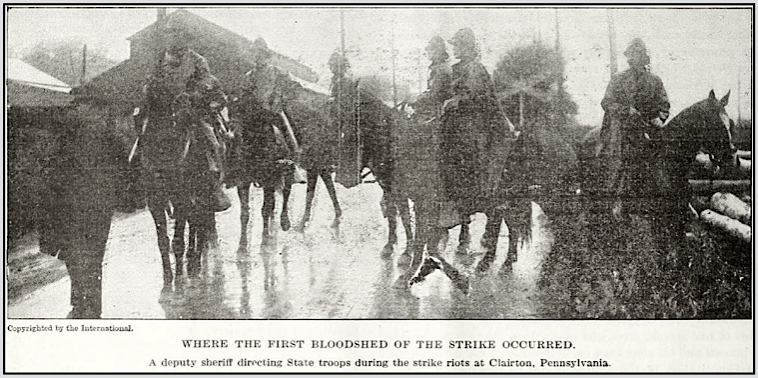 ———-
———-
Hellraisers Journal – Monday December 29, 1919
Mother Jones News for November 1919, Part II
Found in Washington, D. C., Not Afraid of Judge Anderson
From the Lebanon Daily News of November 14, 1919:
—–
(Special to News by United Press)
Washington, Nov. 14.-With the government acting as mediator, mine operators and representatives of the United Mine Workers came together here today in an effort to settle the dispute over wages and hours which caused the recent coal strike.
As the delegates assembled for this “peace conference,” it appeared there would be a deadlock from the very outset.
The union representatives were prepared to enter the conference at 2:30 this afternoon determined to hold out for an uncompromising victory. Less than complete triumph, they feared, will give the extreme radical element control of the miners-the men will lose faith in their conservative leaders. Acting President Lewis was expected to insist on full compliance with the men’s demands of a 50 hour week and wage increases ranging up to sixty per cent.
Operators were solidly in favor of refusing to surrender anything to the workers, according to early indications. They stood pat on the “Washington wage agreement,” contending it runs until the end of the war, and that the war is not ended. Some of them were disposed to emphasize that comparatively few of the miners have returned to work in obedience to their leaders instructions, and it was expected the union chiefs would be asked about this at the outset of the meeting.
Secretary of Labor Wilson, who called the conference, has invited Dr. Harry A. Garfield, Fuel Administrator, to participate in the hope that if an agreement cannot he reached within a reasonable time the government may be able to offer a compromise. Any compromise will probably carry with it an increase in the price of coal to the consumer, so the operators will have increased revenue to pay higher wages.
Garfield, who is in charge of coal prices, was in a position to give expert advice on just what a raise in pay to the workers will mean to the coal market.
That Lewis and his colleagues will not be left in doubt as to how radical labor stands on the miners’ case, “Mother” Jones, of Colorado fame, and Andy Furuseth, head of the Seamen’s union, are here to let them know. Both are emphatic in their disapproval of Lewis’ compliance with Federal Judge Anderson’s order to end the strike.
“The strike should never have been called off,” said Furuseth. “The miners won’t return to work, and I approve of it.”
[Mother Jones Defies John L. Lewis.]
[Said Mother Jones:]
This is a free country, but it would starve people. This is what Judge Anderson’s order means to the miners who are fighting for their freedom and a living.
Next Monday I am going down into West Virginia and urge the miners to stay out until they win. I am not afraid of Judge Anderson. He can send me to jail or he can hang me, but he will have to do it.
Overhearing “Mother’s” remark, Furuseth exclaimed:
Lewis wears pants, but he ought to wear petticoats; Mother, you wear petticoats but you ought to be in Lewis place.


 ———-
———-
 ———-
———-


